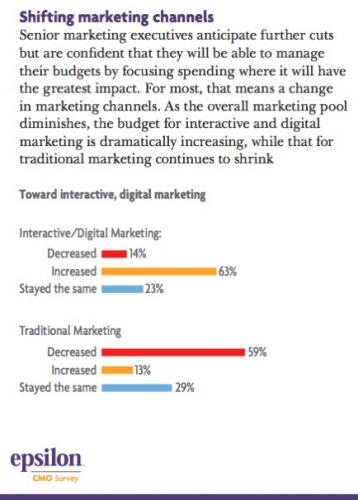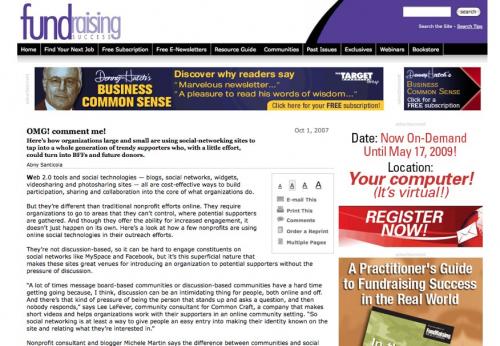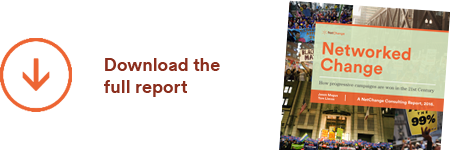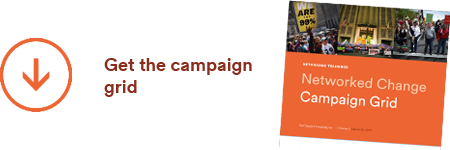A few recent articles I found over the holidays shed some light o n where things are going in 2009, at least in our little web world. The first shows recent survey responses on marketing manager's shift towards digital media in 2009. The second is an article filled with great stories of how social change orgs are using social media to create new results. Despite the enormous economic difficulties around us, both offer hopeful news on the power of social media to help navigate times of massive change, and perhaps even create a stronger, more reslinent, and more innovative sector as a result.
n where things are going in 2009, at least in our little web world. The first shows recent survey responses on marketing manager's shift towards digital media in 2009. The second is an article filled with great stories of how social change orgs are using social media to create new results. Despite the enormous economic difficulties around us, both offer hopeful news on the power of social media to help navigate times of massive change, and perhaps even create a stronger, more reslinent, and more innovative sector as a result.
The NonProfitTimes announced survey results from the Direct Marketing Association, "Economy Changing Charity Marketing Strategies". They found over 2/3 of their respondents – nonprofit executives across the US – plan to change their marketing strategy as a result of the economy, and that same amount intend to invest deeper in social media and Web 2.0 tools to help them stay ahead.
"Several nonprofits plan to decrease their mailings…One said they would make a big push to capture e-mail addresses and make transactions online, making better use of their database with a strategy of more targeted, lower number of pieces mailed. "
Corporate execs were on exactly the same page, with this Epsilon survey showing 65% of CMO's will move more of their mix to digital, or this eMarketer prediction that even the lowered estimate shows online media growth at over 17% over last year, trouncing all other mediums which are shrinking.
This is consistent with what we've seen for a few years now, with big organizations shifting more and more attention and resources to digital. Why?
- efficiency of cost in reaching customers
- innovation in finding them where they are today
- importance of new models of engaging customers vs. shouting at them (to paraphrase Seth Godin)
- the total accountability detailed web metrics offer marketing execs on the impact of their spend
While I am still very respectful of the big guns doing the heavy lifting: direct mail and telephone fundrasing (for non-profits), and mainstream media ad buying (for businesses), it's clear that digital media's importance (dare I say leadership) will continue to grow. The big question on everyone's mind is, once the economy picks up again, will the shift continue? What do you think?
Now to social media. A few weeks before the holidays, I was interviewed by a lovely young writer in Calgary who wrote an extensive story in "Fundraising Success" magazine on how social media is helping non-profits tap into new supporters. She did some excellent background research, and though the article is long it answers a big question many of my clients still have: we know social media is making a lot of noise, but what are real orgs really doing, at scale, that is having a measurable impact on their work? 
I've written before how Obama's presidential win should shut down all but the most entrenched skeptics, but Abny's article is peppered with a few great smaller stories of impact. Though the numbers aren't yet huge, you can see where the winds are blowing. One of my favourite stories is how an LA based spinal cord injury charity converted its #1 ranking on MySpace into donations, email subscribers, volunteers, and advocates:
"Essentially we use MySpace to convert friends in the MySpace sense of the word, which is often superficial, to constituents in the more formal sense, where we feel their level of commitment and desire to support the organization is more defined."
My quote was kind of related to the above:
Jason Mogus…says social technologies are tools that allow organizations to mine this new, nontraditional kind of constituent. "Sure they've got money, but they've also got ideas. They've got groups that they're connected to. They've got energy to talk about your cause or your issue," he says.
"The traditional way is all the ideas come [from] within my four walls, and all the work that gets my campaign messages out comes from within my four walls," he adds. "Whereas with these new tools, other people can actually connect and share and talk about you and offer you ideas and support your messages out in the world."
So despite the downturn, I think we're going to see more and more organizations taking digital and social media communications even more seriously in the next few years. Because right now, perhaps more than ever, we need outreach and engagement tools that work harder for our shrinking budgets.









